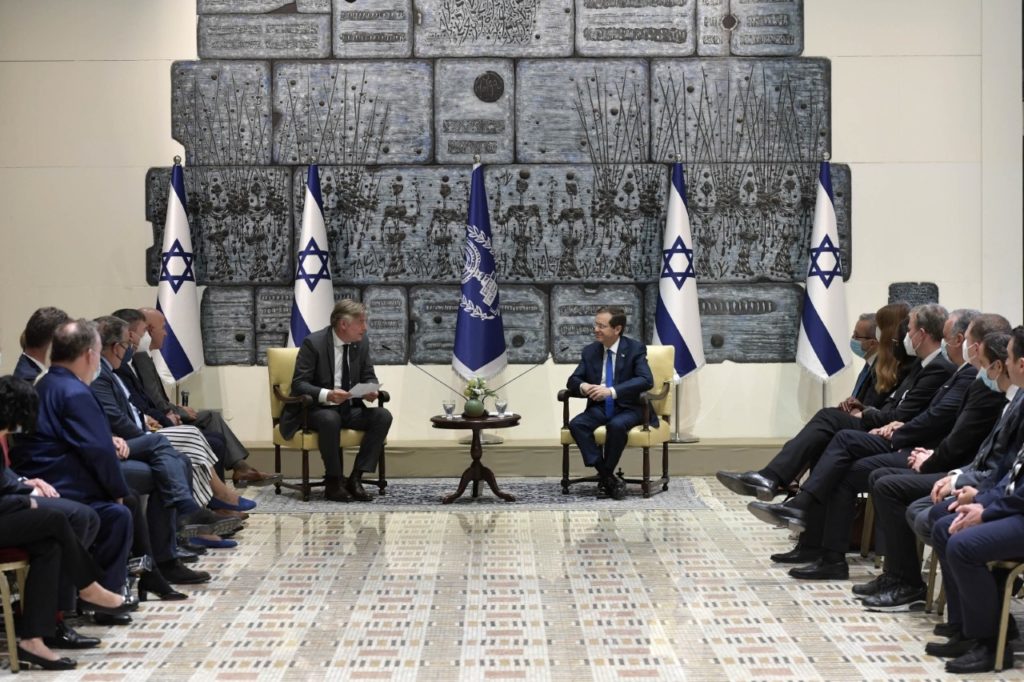A European Parliament delegation visited Israel this week with the purpose of strengthening the relations between the EU and Israel after years of strained relations.
The visit was initiated and hosted by ELNET, an organization fostering ties between Europe and Israel. The delegation consisted of a dozen MEPs representing key member states and the political spectrum and was led by by Antonio López-Isturíz White (EPP-Spain), chairman of the European Parliament Delegation for Relations with Israel.
During the visit, the delegation met with Israel's new President Isaac Herzog, as well as with members of the Israeli parliament (Knesset), officials and experts, to discuss EU - Israel relations and promote shared interests.
The visit was not a fact-finding mission but as part of their visit in the country, the MEPs flew to the north of Israel to experience first-hand the Hezbollah tunnel system uncovered by the Israeli Defense Forces, with a briefing on the situation at the border with Lebanon, where tension is high and an escalation of hostilities with Hezbollah cannot be excluded.
The Israeli President praised Israel's and Europe’s shared intellectual and cultural heritage as a solid foundation for further cooperation and welcomed the launch of the first ever EU Strategy on Combating Antisemitism and Fostering Jewish Life. Ministers in the former government under Benjamin Netanyahu used to accuse the EU of antisemitism when it criticized its policy.
Referring to COP26, the on-going global climate change conference in Glasgow, and the need for innovations, the President said that, “Israel’s great contribution is the great new ideas that it can bring to the world.”
Indeed, Naftali Bennett, the new Israeli Prime-Minister, promised in Glasgow that Israel will be a technological leader against climate change but its pledges to reduce emissions need to backed up by an action plan and enshrined in law, after years of inaction during the previous government according to a recent audit by the State Comptroller’s Office, the country’s watch dog.
“We are two democracies under threat—different threats. You have the survival threat against Iran and its proxies, and we have threats raging from populism and regimes that undermine our democracy,” MEP Antonio López-Isturíz White said at the meeting (3 November).
MEP Andrus Ansip (Renew Europe Group), a former Estonian Prime Minister and Vice-President of the European Commission, told the Brussels Times that his expectations to get first-hand information about developments in Israel and the current political situation were met.
This was not his first visit to Israel. He visited there the first time in 1995. Next time was in 2012 as Estonia’s prime minster.
He has good relations with the local Jewish community and attended the inauguration and re-establishing of a synagogue in 2007 in Tallin after the previous synagogues had been destroyed during WWII. Until the war, Estonian Jews had a flourishing community life including their own schools. Now it starts to be built up again.
“In the EU, member states are largely split about Israel by geographical lines, with central-eastern countries more supportive of Israel and voting in favour of US resolutions on the conflict, while western European countries are more understanding of the Palestinian side,” he explained. “For Estonia, which only recently regained its independence, national self-determination is important.”
“Whatever the position of other member states, I think that it’s totally unacceptable to deny Israel’s right to exist. Our sympathy lies with Israel and we want to deepen EU – Israeli relations. In that regard, I was pleased about the Abraham accords between Israel, Morocco and the Gulf states which will promote economic cooperation between the countries.”
The visit followed the successful conclusion in October of the negotiations on Israel’s participation in EU’s R&D Horizon Europe program. As in previous negotiations, the EU maintained its position that it does not recognise Israel’s sovereignty over the territories occupied since 1967, meaning that no funding will go to entities located there.
The agreement is expected to be signed and enter into force in the first half of December after being ratified by both sides. Chances for this to happen increased significantly after the Israeli parliament early Friday morning finally approved the 2022 state budget with 59 votes for and 56 votes against. The budget was the first hurdle for the new government and is now expected to ensure stability.
Will the visit contribute to improving the relations between the EU and Israel?
“Definitely, but you need both parties for that,” MEP Ansip replied. “It depends also on the EU. Our economic relations are already very close. Israel should become a strategic partner to the EU in the region.”
He supports the two-state solution for the Israeli-Palestinian conflict and added that the Palestinians in Israel – that are becoming increasingly more integrated in the country - also support it. “But it is difficult to negotiate if the other side doesn’t recognize your right to exist. The Palestinians must give something in return.”
M. Apelblat
The Brussels Times

